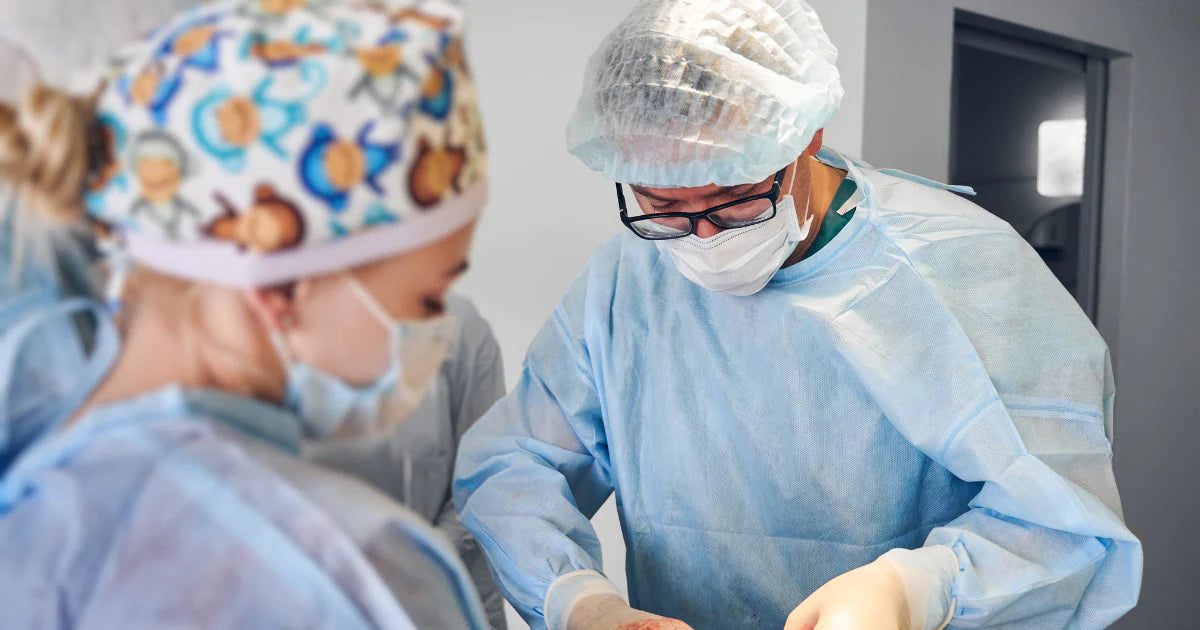What to Avoid Eating After Surgery: The Complete Guide

You've done your research, chosen your surgeon, and mentally prepared for your procedure. But here's what nobody warns you about: the wrong foods after surgery can sabotage your entire recovery.
It sounds dramatic, but it's true. While you're focused on rest and wound care, certain foods are quietly working against you – slowing healing, increasing inflammation, and making you feel worse than necessary.
The frustrating part? Much of the "helpful" advice floating around contradicts itself. One source says pineapple juice helps with healing, another warns against it. Someone recommends protein-rich cheese, while your surgeon mentions avoiding dairy. No wonder you're confused.
Here's the reality: what you eat in the weeks following surgery can make or break your recovery. The good news? Once you understand which foods help and which hurt, making the right choices becomes straightforward.
This guide cuts through the confusion with science-backed, practical advice you can actually follow. We'll cover exactly what to avoid, when to avoid it, and – most importantly – what to eat instead so you heal faster, feel better, and get back to your life.
Why What You Eat After Surgery Matters More Than You Think
Your body after surgery isn't operating under normal rules. Between the physical trauma of the procedure and the lingering effects of anesthesia, your digestive system, immune function, and metabolic processes are all running in crisis mode.
The Anesthesia Factor
Anesthesia doesn't just make you unconscious – it significantly impacts your digestive system for days afterward. Your gut motility (the movement of food through your digestive tract) slows down dramatically, which is why constipation and nausea are so common post-surgery. Foods that are normally easy to digest can suddenly become problematic.
Your Immune System Is Overworked
Surgery triggers a massive inflammatory response as your body works to heal damaged tissue. This is normal and necessary, but it also means your immune system is operating at maximum capacity. Foods that promote additional inflammation force your body to fight on multiple fronts, diverting energy away from healing your surgical site.
Blood Sugar Becomes Critical
Your body naturally produces more glucose after surgery as part of the stress response. Add high-sugar foods to the mix, and you create blood sugar spikes that impair immune function and slow wound healing. Even if you've never had blood sugar issues before, surgery temporarily changes how your body processes glucose.
Nutrient Needs Skyrocket
Your protein requirements can increase by 50-75% during recovery. Your need for vitamin C, zinc, and other healing nutrients also jumps significantly. Filling up on foods that provide calories without nutrients is like trying to build a house with inferior materials – technically possible, but the results won't be pretty.
The bottom line:
Surgery creates a temporary state where food choices have amplified consequences. What might cause minor digestive upset on a normal day can derail your recovery when your body is already struggling to heal.

Foods to Completely Avoid (First 2 Weeks Post-Surgery)
These foods actively work against your recovery during the most critical healing phase. Avoiding them isn't just a suggestion – it's essential for optimal outcomes.
Red Meat & Processed Meats: The Healing Saboteurs
What to Avoid:
-
Beef (steak, ground beef, hamburgers)
-
Pork (bacon, ham, pork chops)
-
Lamb
-
Processed meats (hot dogs, deli meat, sausage, pepperoni)
Why They're Problematic:
Red meat might be nutritious under normal circumstances, but after surgery, it becomes a liability. The high saturated fat content significantly slows gut motility, which is already compromised from anesthesia. When your digestive system can't move food efficiently, you experience increased nausea, loss of appetite, and constipation – none of which help your recovery.
Processed meats add insult to injury with their high sodium content, preservatives, and inflammatory compounds. These foods require significant digestive energy to break down when your body needs to focus that energy on healing.
The Gut Motility Connection:
Think of your digestive system like a conveyor belt that's been slowed to half speed. Throwing heavy, fatty foods onto that belt creates backups and jams. The result? Everything slows down even more, creating a cascade of digestive issues that can persist for weeks.
Better Alternatives:
-
Ground turkey or chicken (98% lean)
-
Fish (salmon, cod, tilapia)
-
Eggs and egg whites
-
Plant-based proteins like lentils or tofu
High-Sodium Foods: The Swelling Promoters
What to Avoid:
-
Processed and packaged foods
-
Canned soups and broths (unless low-sodium)
-
Restaurant meals and takeout
-
Frozen dinners
-
Condiments and sauces
-
Pickled foods
-
Salted nuts and snacks
Why Sodium Is Problematic:
After surgery, your body is already dealing with inflammation and potential swelling at the surgical site. High-sodium foods exacerbate this by promoting fluid retention throughout your body. This isn't just about cosmetic swelling – excess fluid can interfere with proper wound healing and make you feel puffy and uncomfortable.
Additionally, many people experience elevated blood pressure after surgery due to pain and stress. High-sodium foods can push your blood pressure even higher, potentially causing complications or interactions with medications.
Hidden Sodium Sources:
-
Bread and baked goods (surprisingly high)
-
Cheese (especially processed varieties)
-
Condiments (ketchup, soy sauce, salad dressings)
-
Canned vegetables (unless labeled "no salt added")
-
Sports drinks and electrolyte beverages
Better Alternatives:
-
Fresh fruits and vegetables
-
Homemade broths and soups
-
Herbs and spices for flavoring instead of salt
-
Fresh or frozen proteins without added sodium
Sugary Foods & Drinks: The Blood Sugar Disruptors
What to Avoid:
-
All fruit juices (yes, even "healthy" ones like pineapple juice)
-
Sodas and soft drinks
-
Candy and sweets
-
Pastries and baked goods
-
Sports drinks
-
Flavored yogurts with added sugar
-
Sweetened coffee drinks
The Pineapple Juice Myth:
You've probably heard that pineapple juice helps with post-surgical healing because of its bromelain content. While bromelain does have anti-inflammatory properties, the sugar content in pineapple juice far outweighs any benefits. A single cup contains 25 grams of sugar – equivalent to more than 6 teaspoons.
LEARN MORE ABOUT IF PINEAPPLE IS GOOD FOR PLASTIC SURGERY
After surgery, your body naturally produces more glucose as part of the stress response. Adding high-sugar foods creates dangerous blood sugar spikes that:
-
Impair immune function
-
Slow wound healing
-
Increase inflammation
-
Promote bacterial growth
-
Interfere with collagen formation
Blood Sugar and Healing:
Elevated blood sugar literally changes the environment around your incision. High glucose levels make it harder for your body to fight off potential infections and slow the formation of new tissue. Even if you don't have diabetes, your body's ability to manage blood sugar is temporarily compromised after surgery.
Better Sweet Alternatives:
-
Diluted pear juice (50% water, 50% juice)
-
Herbal teas with a small amount of honey
-
Fresh fruit in small portions
-
Homemade smoothies with protein powder and minimal fruit
Diluted Pear Juice Recipe:
Mix 1/2 cup pure pear juice with 1/2 cup water. This reduces the sugar content from 24g to 12g per cup while still providing gentle sweetness and easier digestion than other fruit juices.
Hard-to-Digest Foods: The Energy Vampires
What to Avoid:
-
Hard cheeses (cheddar, gouda, provolone, parmesan)
-
Fried and deep-fried foods
-
Raw vegetables (especially cruciferous ones like broccoli, cauliflower)
-
Nuts and seeds
-
Tough cuts of meat
-
High-fiber foods (temporarily)
-
Beans and legumes (in large quantities)
Why Digestion Matters During Recovery:
Your digestive system is working at reduced capacity due to anesthesia, pain medications, and the stress of surgery. Foods that require significant energy to break down divert resources away from healing. It's like asking someone to do heavy lifting while they're recovering from the flu – technically possible, but not ideal.
Hard Cheese Problems:
While cheese provides protein and calcium, hard cheeses are problematic because they're:
-
High in saturated fat (slows digestion)
-
High in sodium (promotes swelling)
-
Difficult to break down (requires digestive energy)
-
Often constipating (compounds anesthesia effects)
Better Cheese Options:
-
Ricotta cheese (softer, easier to digest)
-
Goat cheese (lower in lactose and saturated fat)
-
Greek yogurt (provides probiotics and protein)
-
Cottage cheese (high protein, easier digestion)
Inflammatory Foods: The Healing Hijackers
What to Avoid:
-
Trans fats (partially hydrogenated oils)
-
Highly processed oils (corn, soybean, vegetable oil)
-
Fried foods
-
Margarine and shortening
-
Packaged snack foods
-
Fast food
-
Excessive omega-6 oils
The Inflammation Connection:
Surgery naturally triggers inflammation as part of the healing process. This is necessary and beneficial in the short term. However, foods that promote additional inflammation can cause this response to become excessive or prolonged, leading to:
-
Delayed wound healing
-
Increased pain and swelling
-
Higher risk of complications
-
Slower overall recovery
Trans Fats, The Worst Offender:
Even small amounts of trans fats can significantly impair immune function and wound healing. These artificial fats interfere with your body's ability to produce beneficial compounds that regulate inflammation and promote healing.
Better Fat Sources:
-
Olive oil and avocado oil
-
Nuts and seeds (in small amounts after week 2)
-
Fatty fish like salmon and sardines
-
Avocados
Foods to Limit (Weeks 2-6 Post-Surgery)
As your digestive system begins to normalize, you can gradually reintroduce some foods while still being mindful of portions and frequency.
Moderate Reintroduction Guidelines
Week 2-3: Cautious Additions
-
Small amounts of lean red meat (once or twice per week maximum)
-
Limited portions of raw vegetables
-
Small servings of higher-fiber foods
-
Occasional treats in very small portions
Week 4-6: Gradual Normalization
-
Larger portions of previously limited foods
-
More variety in food choices
-
Return to normal eating patterns (with continued focus on healing foods)
Portion Control During Recovery:
Even "allowed" foods should be consumed in smaller portions than usual. Your digestive capacity is still reduced, and overeating any food can cause discomfort and divert energy from healing.
Signs You're Reintroducing Too Much Too Fast:
-
Return of nausea or digestive upset
-
Increased fatigue
-
Changes in bowel movements
-
Decreased appetite
-
Any unusual symptoms at your surgical site
Alcohol and Caffeine: Special Considerations
Alcohol:
Completely avoid alcohol for at least 2-3 weeks post-surgery, and limit it significantly for up to 6 weeks. Alcohol interferes with immune function, disrupts sleep (critical for healing), and can interact dangerously with pain medications.
Caffeine:
Limit caffeine intake, especially if you're experiencing anxiety or sleep issues. Caffeine can also interfere with certain pain medications and may worsen digestive upset.
The Worst Offenders: Foods That Actively Harm Recovery
Some foods don't just fail to help your recovery – they actively work against it. These should be avoided completely during your healing period.
Alcohol: The Recovery Destroyer
Alcohol deserves special mention because of how comprehensively it sabotages healing:
-
Immune Suppression: Even moderate alcohol intake suppresses immune function for up to 24 hours
-
Sleep Disruption: Alcohol fragments sleep patterns, reducing the deep sleep necessary for tissue repair
-
Medication Interactions: Dangerous interactions with pain medications and antibiotics
-
Inflammation: Promotes systemic inflammation
-
Nutrient Depletion: Interferes with absorption of healing nutrients like vitamin C and zinc
Highly Processed Foods: The Nutrient Thieves
Ultra-processed foods (packaged snacks, fast food, convenience meals) provide calories without the nutrients your body desperately needs for healing. They're often loaded with:
-
Inflammatory oils
-
Excessive sodium
-
Hidden sugars
-
Artificial additives that may interfere with healing
The Opportunity Cost Problem:
Every meal is an opportunity to provide your body with healing nutrients. Processed foods don't just fail to provide these nutrients – they often require nutrients to process and eliminate, creating a net negative effect on your recovery.
Foods That Interact with Common Post-Surgery Medications
Grapefruit and Grapefruit Juice:
Can interfere with many medications by affecting liver enzymes.
High-Vitamin K Foods (in excess):
If you're on blood thinners, large amounts of leafy greens, broccoli, or Brussels sprouts can interfere with medication effectiveness.
Tyramine-Rich Foods:
If you're on certain pain medications, aged cheeses, cured meats, and fermented foods may cause interactions.
What to Eat Instead: Your Post-Surgery Nutrition Game Plan
Now that you know what to avoid, let's focus on what will actually help your recovery.
Healing-Focused Food Categories
High-Quality Proteins (25-30g per meal):
-
Fish (especially salmon, mackerel, sardines)
-
Poultry (chicken, turkey)
-
Eggs
-
Greek yogurt
-
Protein powder (whey or plant-based)
Anti-Inflammatory Foods:
-
Fatty fish rich in omega-3s
-
Leafy greens (cooked, not raw initially)
-
Berries (blueberries, strawberries)
-
Turmeric and ginger
-
Green tea
Easily Digestible Carbohydrates:
-
White rice (easier to digest than brown initially)
-
Sweet potatoes
-
Bananas
-
Oatmeal
-
Bone broth
Healing Fats:
-
Avocado and avocado oil
-
Olive oil
-
Nuts and seeds (after week 2)
-
Coconut oil
Easy Preparation Tips for Low Energy Days
Batch Cooking Strategies:
-
Prepare large batches of protein when you feel well
-
Pre-cut vegetables for easy cooking
-
Make large pots of healing soups and freeze portions
-
Pre-portion snacks in small containers
One-Pot Meals:
-
Slow cooker chicken and vegetable stew
-
Rice cooker meals with protein and vegetables
-
Sheet pan dinners with fish and roasted vegetables
Comprehensive Nutritional Support
Sometimes whole foods alone aren't enough to meet your dramatically increased nutritional needs during recovery. This is where targeted supplementation becomes valuable.
Before + After Vitals is a NutriSurgival powder that provides a comprehensive approach to post-surgical nutrition, combining everything your body needs for optimal healing in one convenient scoop. This 8-in-1 formula includes:
-
High-quality protein for tissue repair and wound healing
-
Collagen peptides to support healthy scar formation
-
Essential amino acids for protein synthesis and immune function
-
Vitamins and minerals in therapeutic doses for healing
-
Probiotics and prebiotics to restore digestive health after antibiotics and anesthesia
-
Digestive enzymes to help break down foods when your system is compromised
Why This Matters During Recovery:
Your nutritional needs can increase by 50-100% after surgery, but your appetite and digestive capacity often decrease. This creates a challenging gap between what your body needs and what you can realistically consume through food alone.
Integration with Your Recovery Diet:
The powder dissolves easily into smoothies, soups, or even water, making it simple to add comprehensive nutrition to your existing meals without adding digestive burden. Users report that 79% experienced beautiful incision healing and 85% had faster recovery times, suggesting that comprehensive nutritional support can significantly impact outcomes.
Red Flags: When Food Choices Signal Problems
Your body will tell you if your food choices are hindering recovery. Watch for these warning signs:
Digestive Red Flags
-
Persistent nausea beyond the first few days
-
Severe constipation lasting more than 3-4 days
-
Unusual abdominal pain or cramping
-
Changes in bowel movements (color, consistency, frequency)
Healing Red Flags
-
Increased swelling that doesn't improve with elevation and rest
-
Changes in wound appearance (increased redness, unusual discharge)
-
Slower than expected healing compared to your surgeon's timeline
-
Unusual fatigue that's getting worse instead of better
Systemic Red Flags
-
Persistent elevated blood sugar (if you're monitoring)
-
Blood pressure changes outside normal ranges
-
Unusual mood changes or depression
-
Sleep disturbances that aren't improving
When to Contact Your Healthcare Team
Don't hesitate to reach out if you experience:
-
Any signs of infection (fever, unusual wound changes)
-
Severe digestive issues that prevent adequate nutrition
-
Concerns about medication interactions with foods
-
Questions about when to reintroduce specific foods
Remember, your healthcare team wants to hear from you if you're concerned. It's always better to ask questions than to suffer in silence or make assumptions about what's normal.
Your Action Plan & Quick Reference
Phase 1: Pre-Surgery Preparation
-
Stock your kitchen with approved foods
-
Prepare and freeze healing soups and broths
-
Remove tempting foods that you should avoid
-
Plan your first week of meals
Phase 2: Immediate Post-Surgery (Days 1-7)
Completely Avoid:
-
Red meat, processed meats
-
Hard cheeses, high-fat dairy
-
Sugary foods and drinks
-
Raw vegetables and tough fruits
-
Fried and processed foods
-
Alcohol and excessive caffeine
Focus On:
-
Lean proteins (fish, poultry, eggs)
-
Easy carbohydrates (rice, bananas, oatmeal)
-
Cooked vegetables
-
Bone broth and mild soups
-
Adequate hydration
Phase 3: Early Recovery (Weeks 2-3)
-
Gradually add variety while maintaining restrictions
-
Monitor your body's response to new foods
-
Continue prioritizing protein and anti-inflammatory foods
-
Begin gentle fiber introduction
Phase 4: Extended Recovery (Weeks 4-6)
-
Carefully reintroduce previously avoided foods
-
Maintain focus on nutrient-dense choices
-
Listen to your body's signals
-
Consider comprehensive nutritional support if needed
Emergency Snack Ideas for Tough Days
When you're struggling with appetite or nausea:
-
Protein smoothie with banana and ginger
-
Bone broth with a soft-boiled egg
-
Greek yogurt with a drizzle of honey
-
Applesauce mixed with protein powder
-
Herbal tea with a small piece of toast
Meal Prep Shortcuts for Recovery
-
Freezer smoothie packs: Pre-portion smoothie ingredients in freezer bags
-
Soup cubes: Freeze bone broth in ice cube trays for easy portioning
-
Protein portions: Cook and freeze individual protein servings
-
Snack containers: Pre-portion approved snacks for easy grabbing
Your Recovery Nutrition Success Plan
Healing from surgery is a marathon, not a sprint. The food choices you make in the coming weeks will either support your body's incredible ability to heal or create additional obstacles to overcome.
Remember these key principles:
-
Avoid doesn't mean forever – most restrictions are temporary
-
Quality over quantity – focus on nutrient-dense foods
-
Listen to your body – it will tell you what's working
-
Progress isn't always linear – some days will be better than others
Your body wants to heal.
Surgery triggers an amazing cascade of biological processes designed to repair, rebuild, and restore your tissue. By avoiding foods that interfere with these processes and choosing foods that support them, you're giving your body the best possible chance to heal quickly and completely.
Every meal is an opportunity to either help or hinder your recovery. Choose to help. Your future self – pain-free, healed, and back to full strength – will thank you for every thoughtful food choice you make today.
You've got this.
Recovery nutrition isn't about perfection; it's about making informed choices that support your healing journey. Take it one meal at a time, be patient with yourself, and trust that your body knows how to heal when you give it the right tools.
Your surgery was an investment in your health and well-being. Now it's time to protect that investment with the fuel your body needs to heal beautifully.
Important Medical Disclaimer
This content is provided for educational and informational purposes only and should never be considered a substitute for professional medical advice, diagnosis, or treatment. Every person's surgical experience and healing process is unique, influenced by factors including the specific procedure performed, individual health status, age, genetics, and adherence to post-operative care instructions.
The mention of specific products, supplements, treatments, or techniques in this article does not constitute medical advice or professional endorsement. Always consult with your healthcare providers before starting any new supplements, treatments, or significant changes to your recovery routine, as these may interact with prescribed medications or interfere with your healing process.
Before + After Vitals
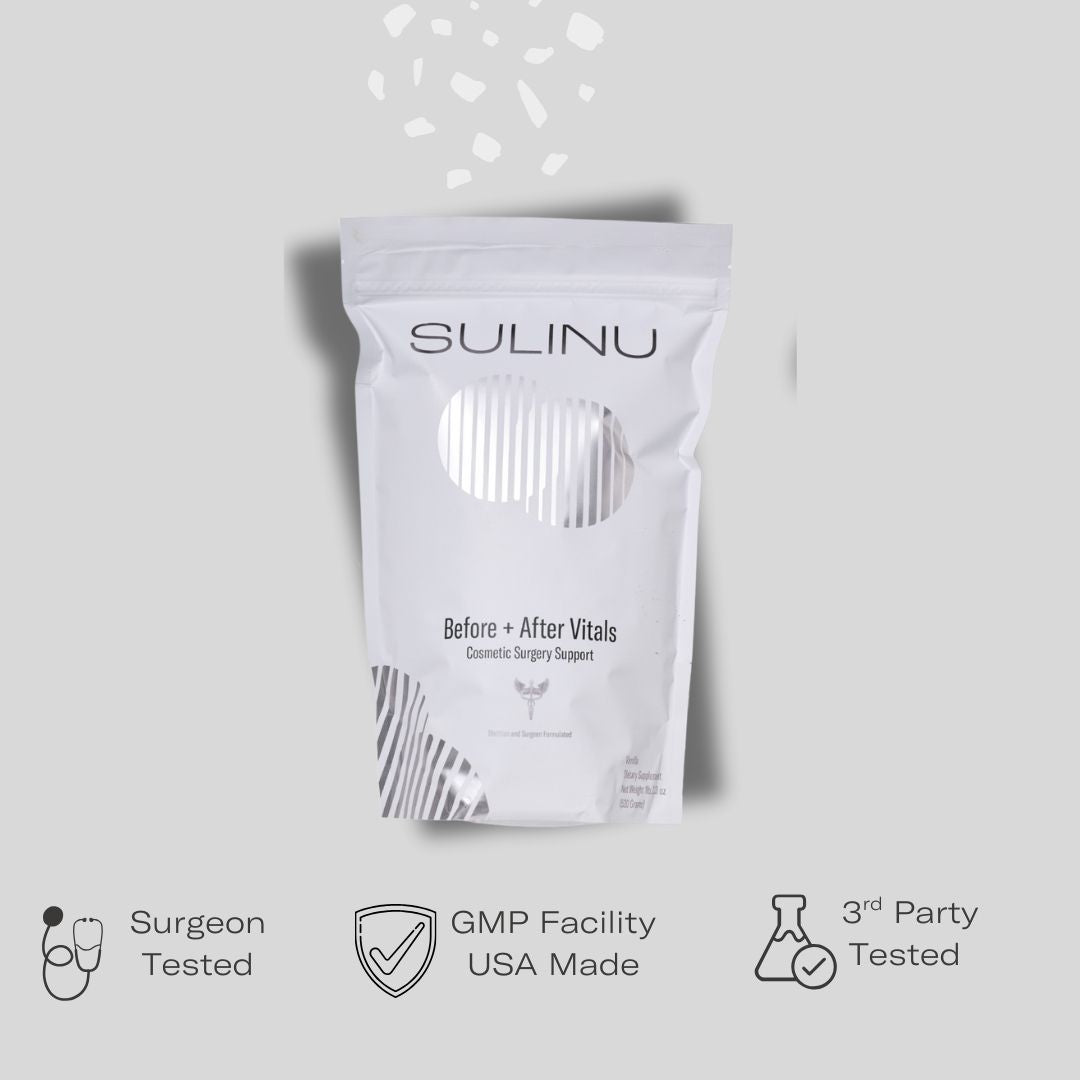
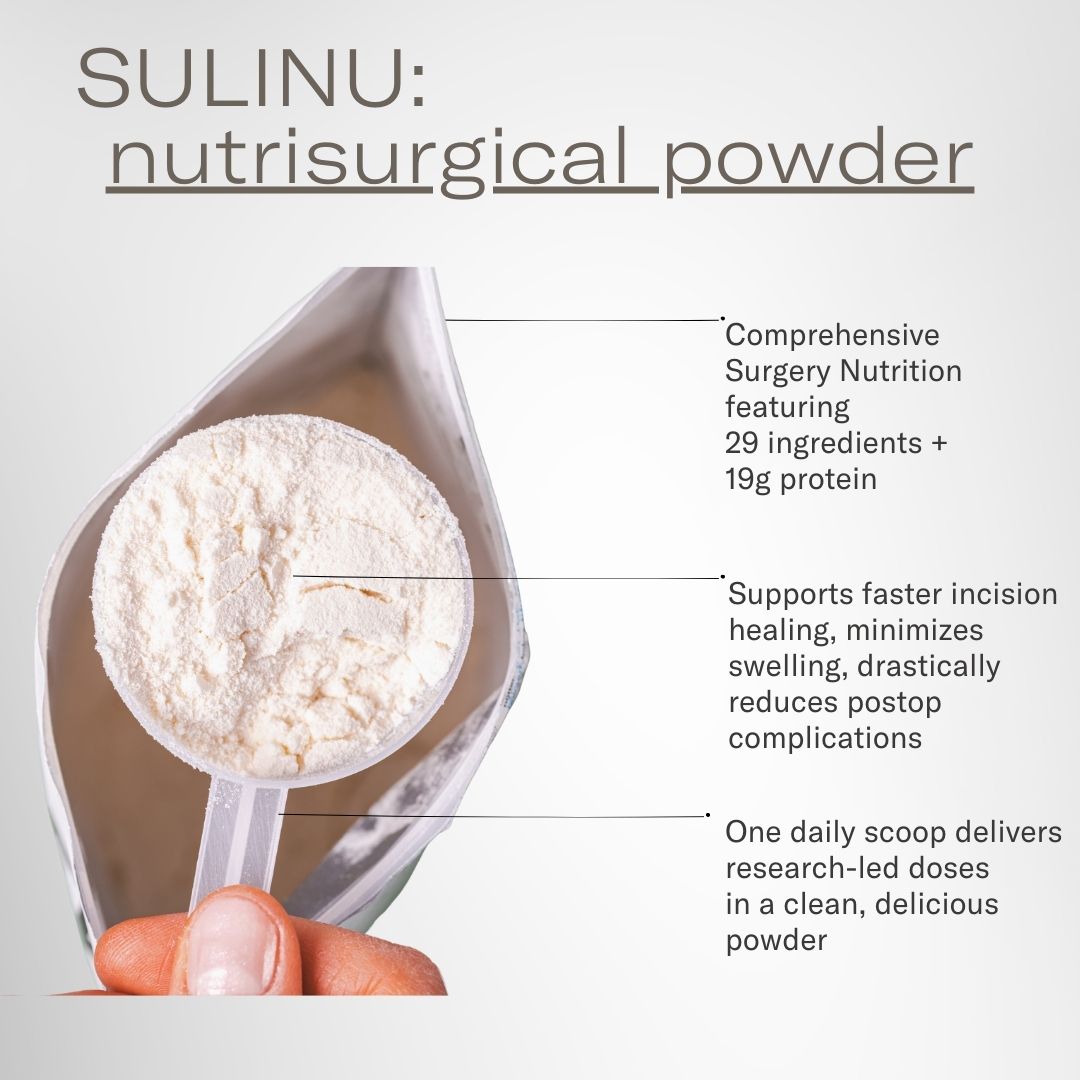
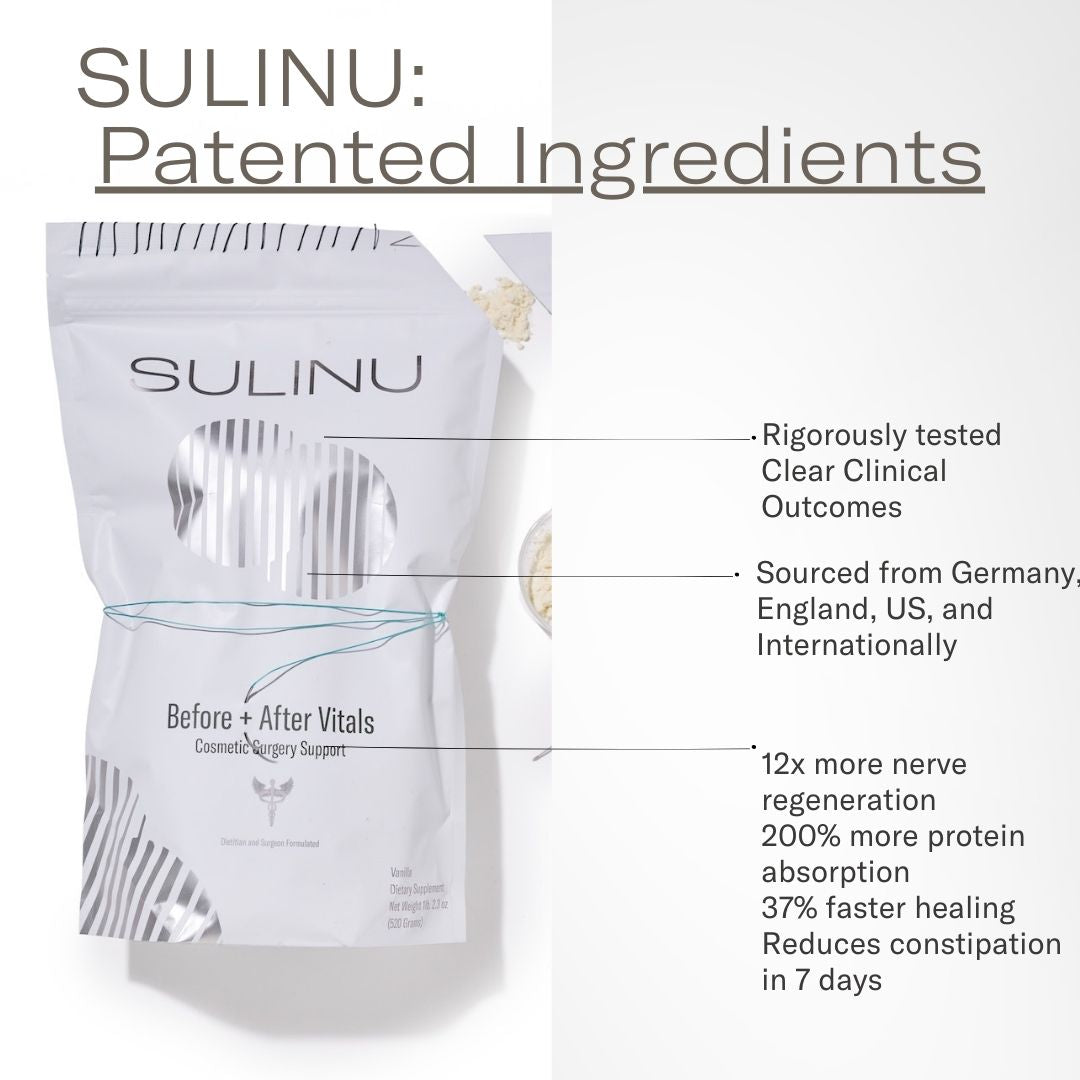
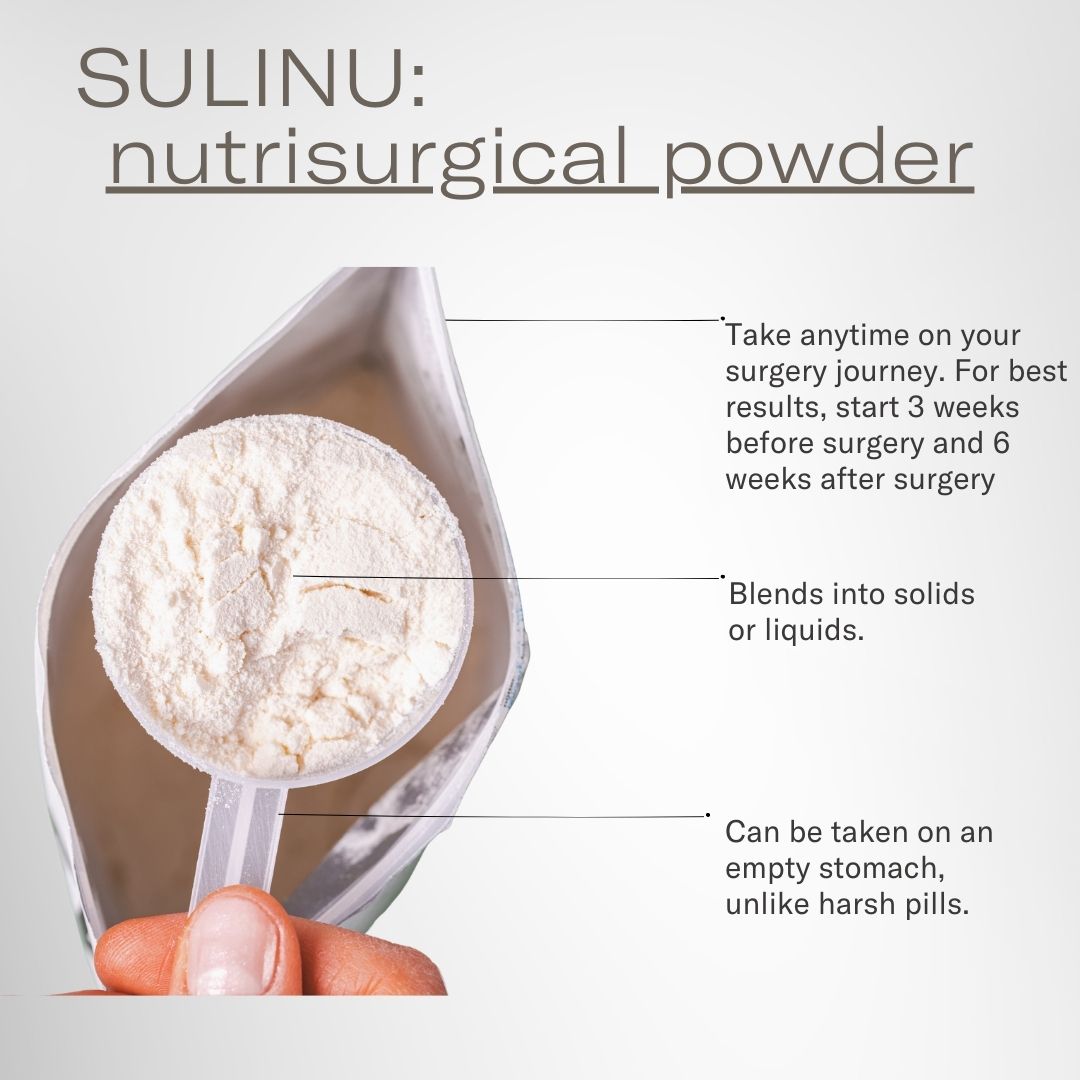
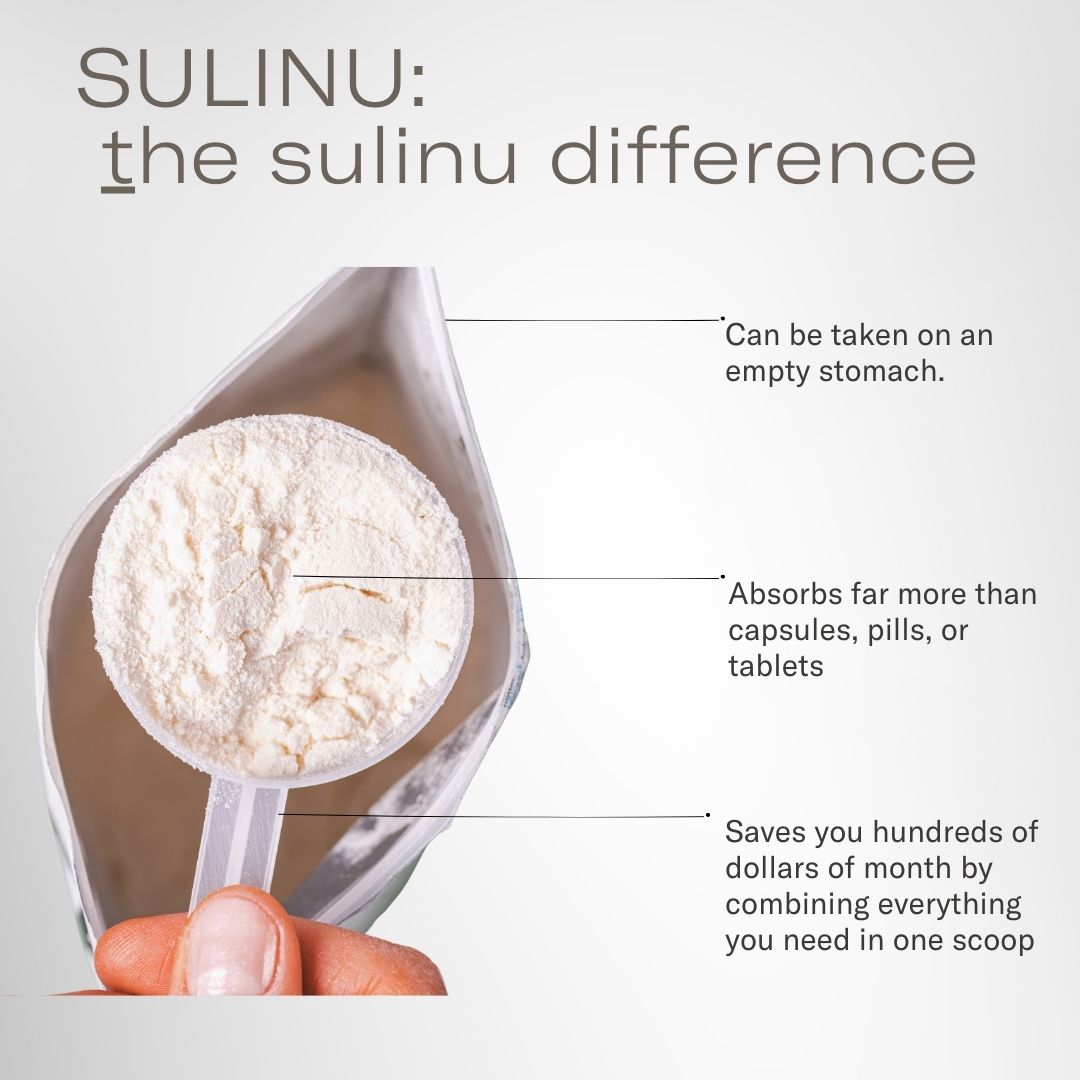
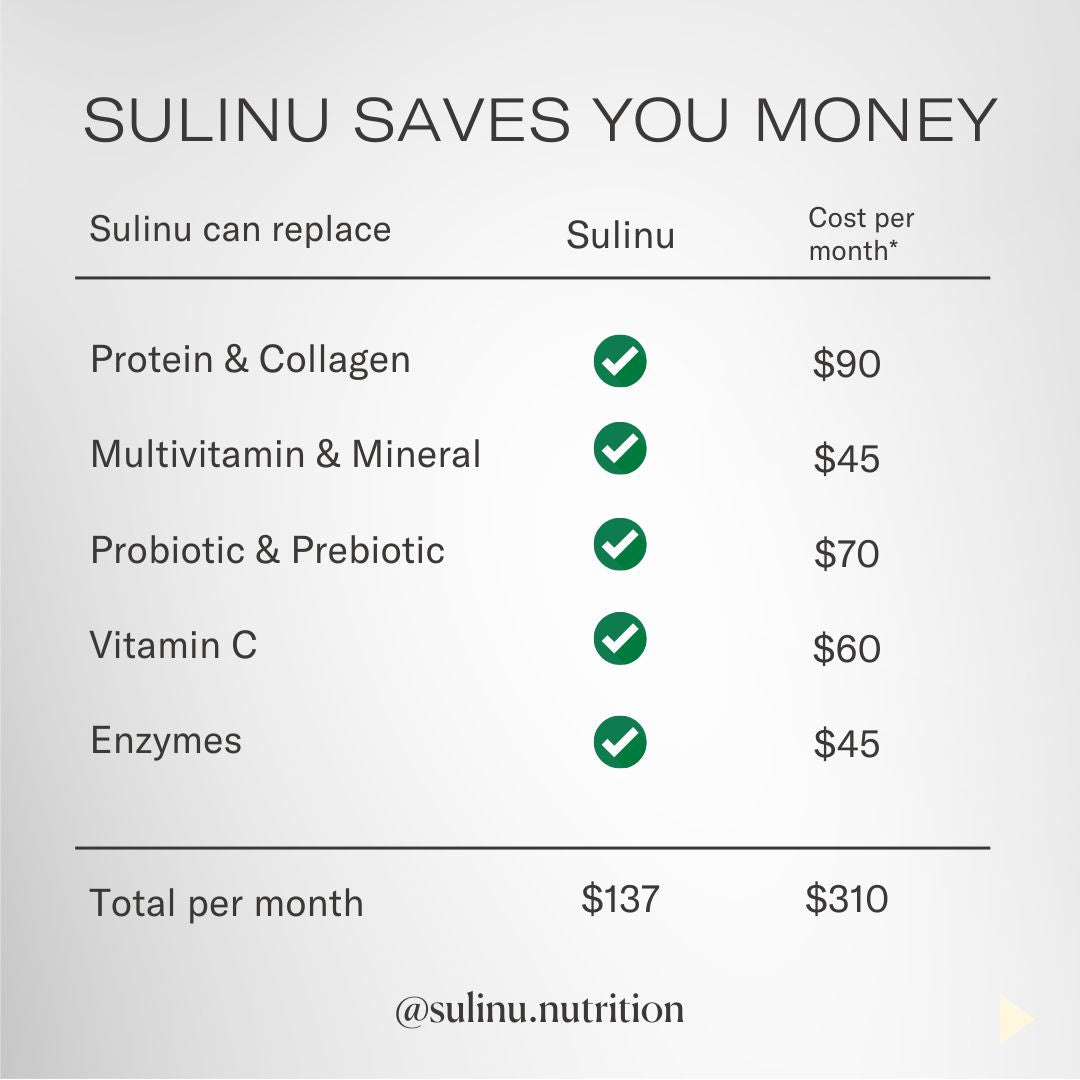
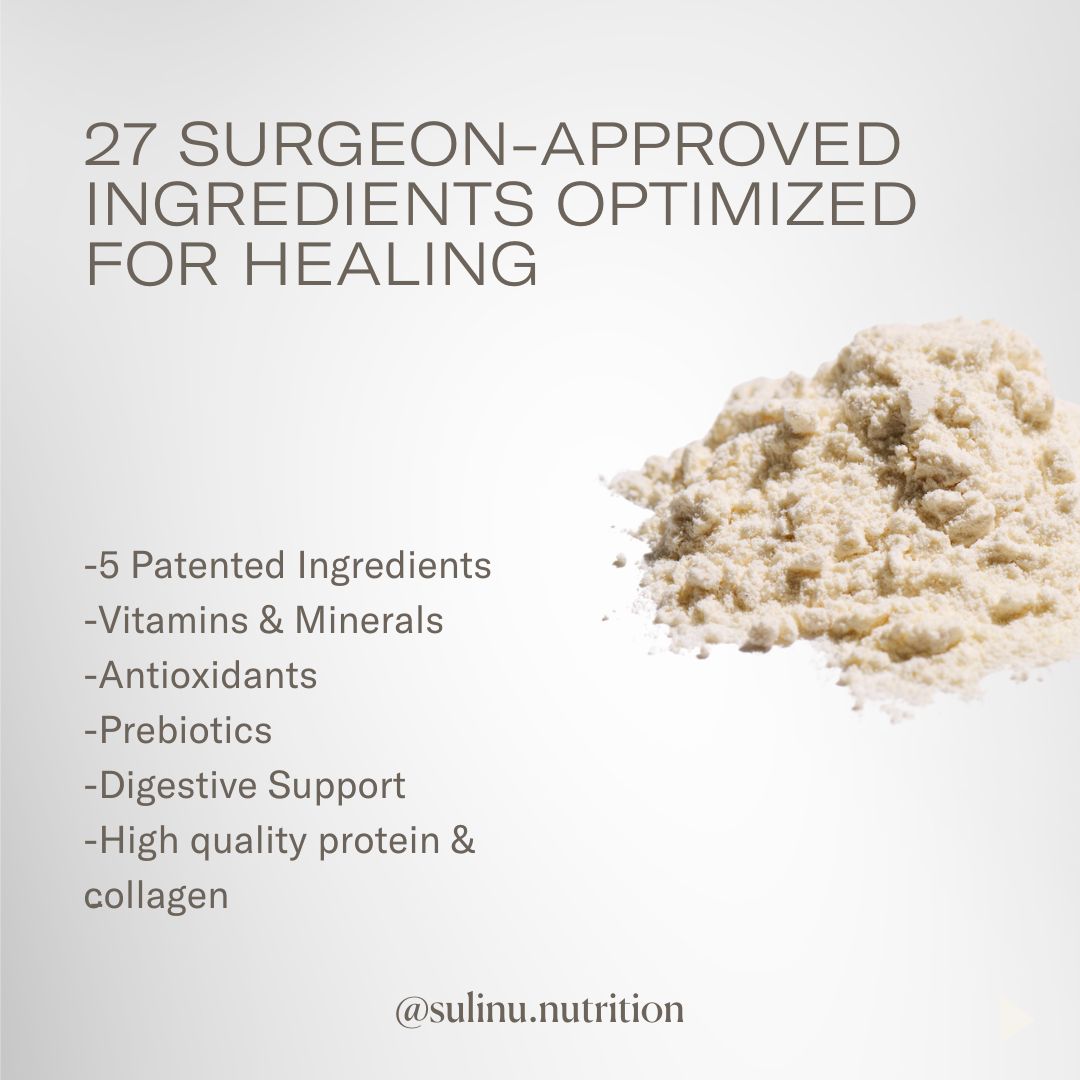
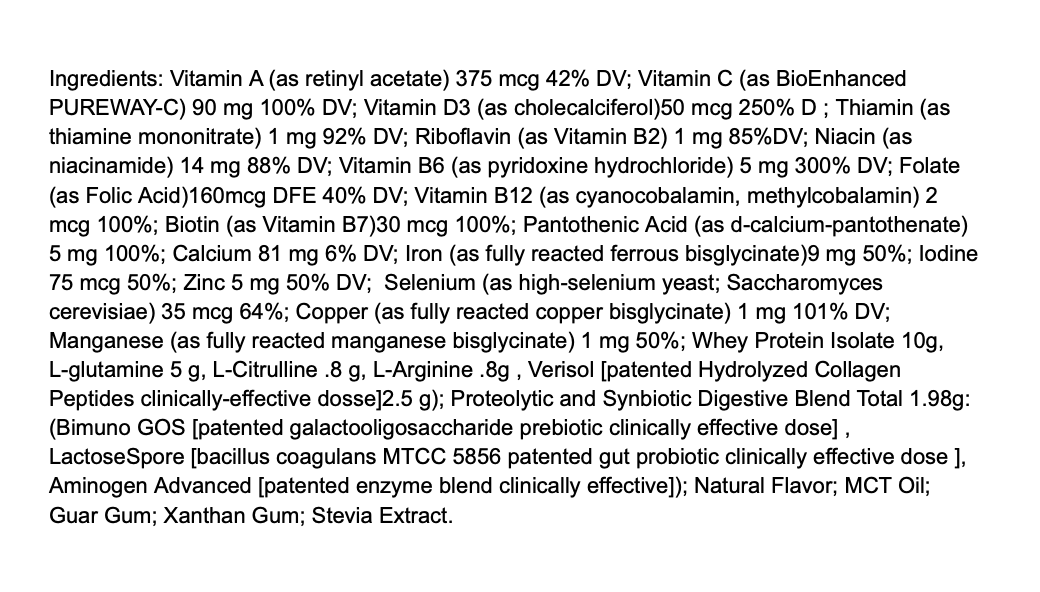
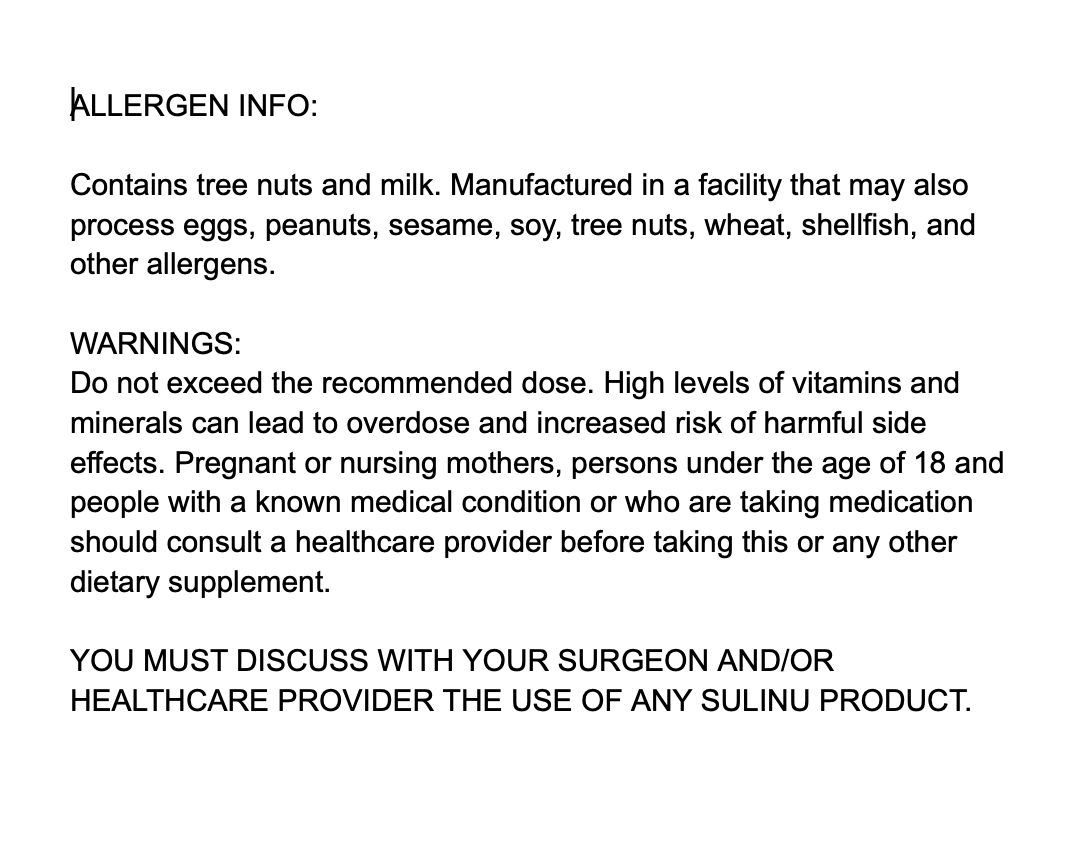
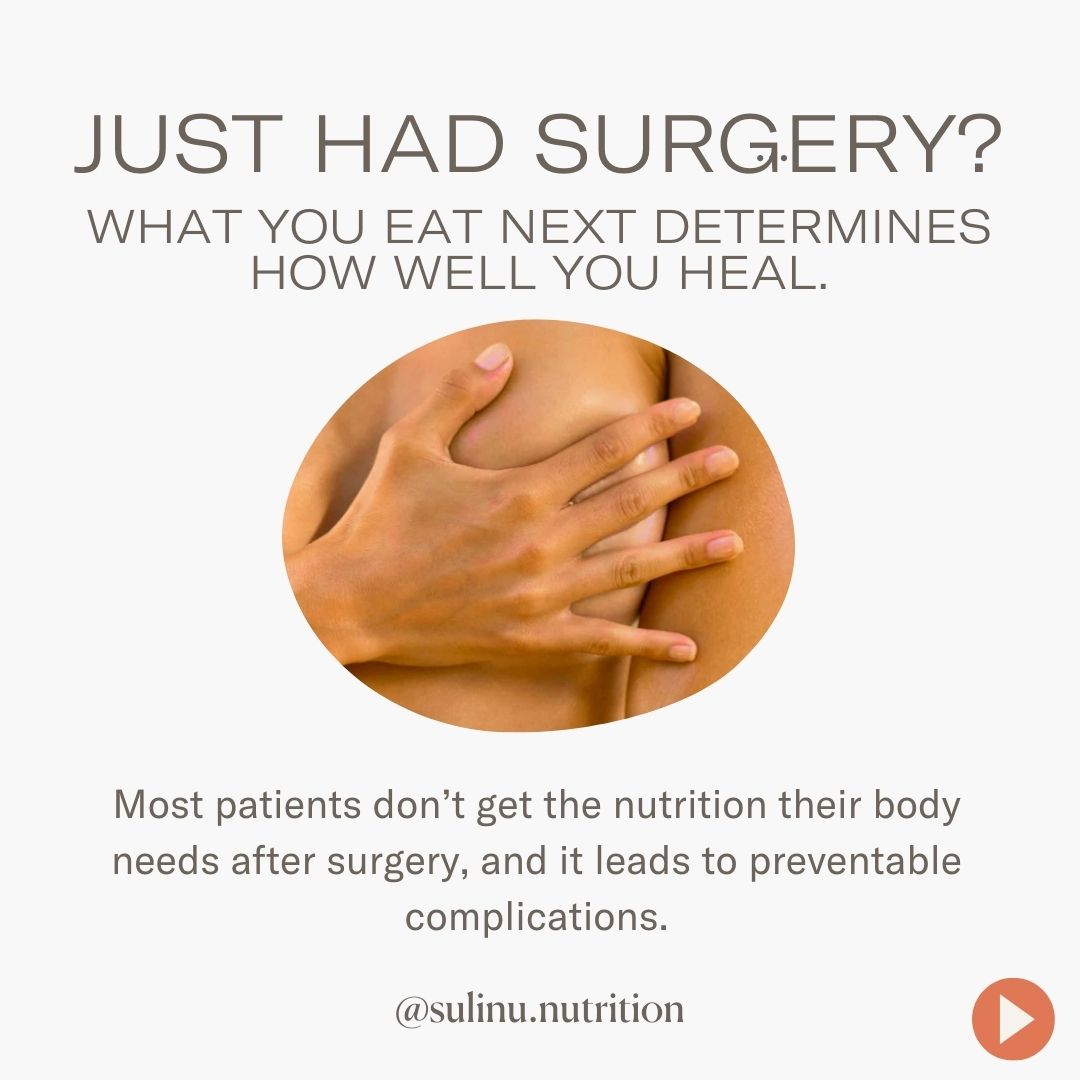
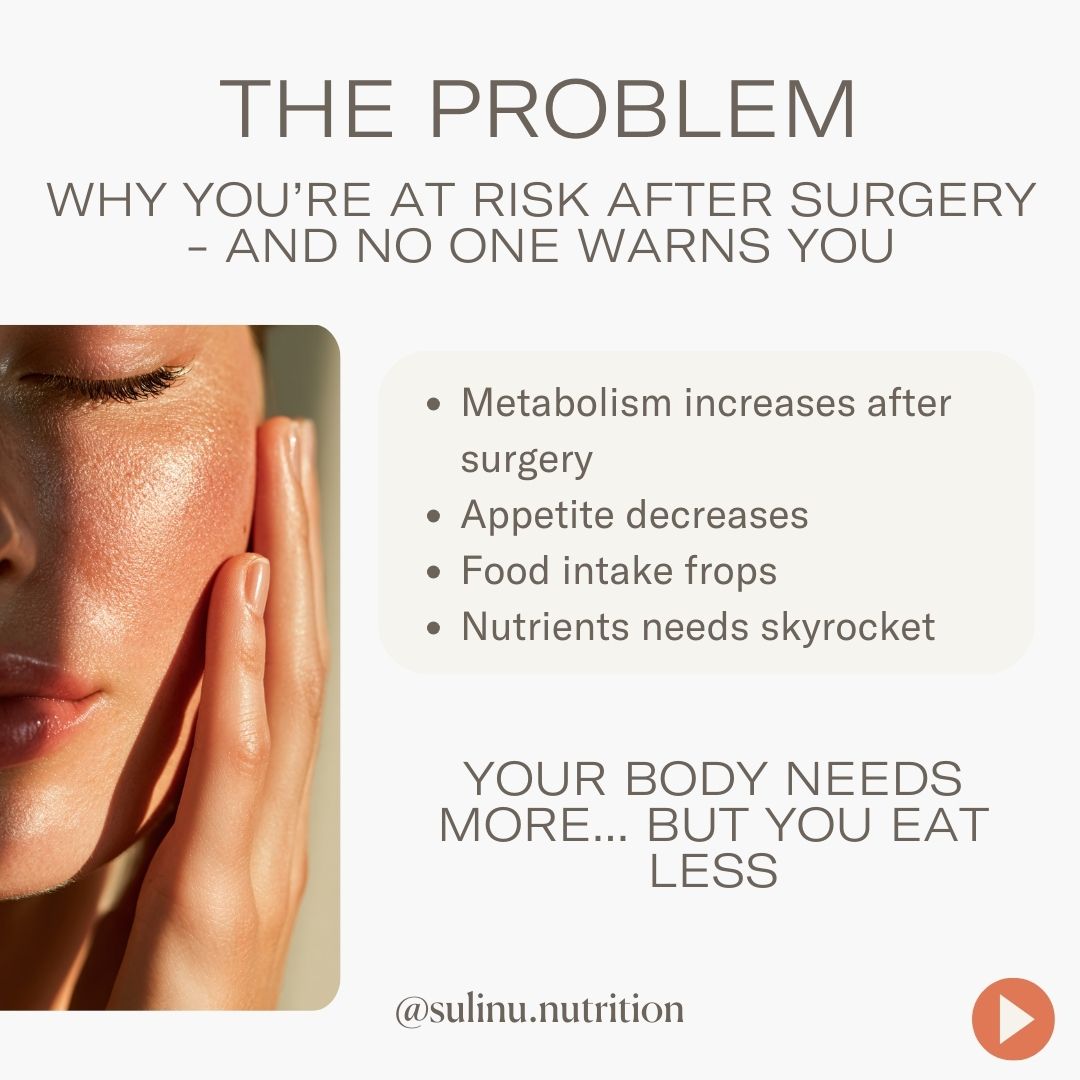
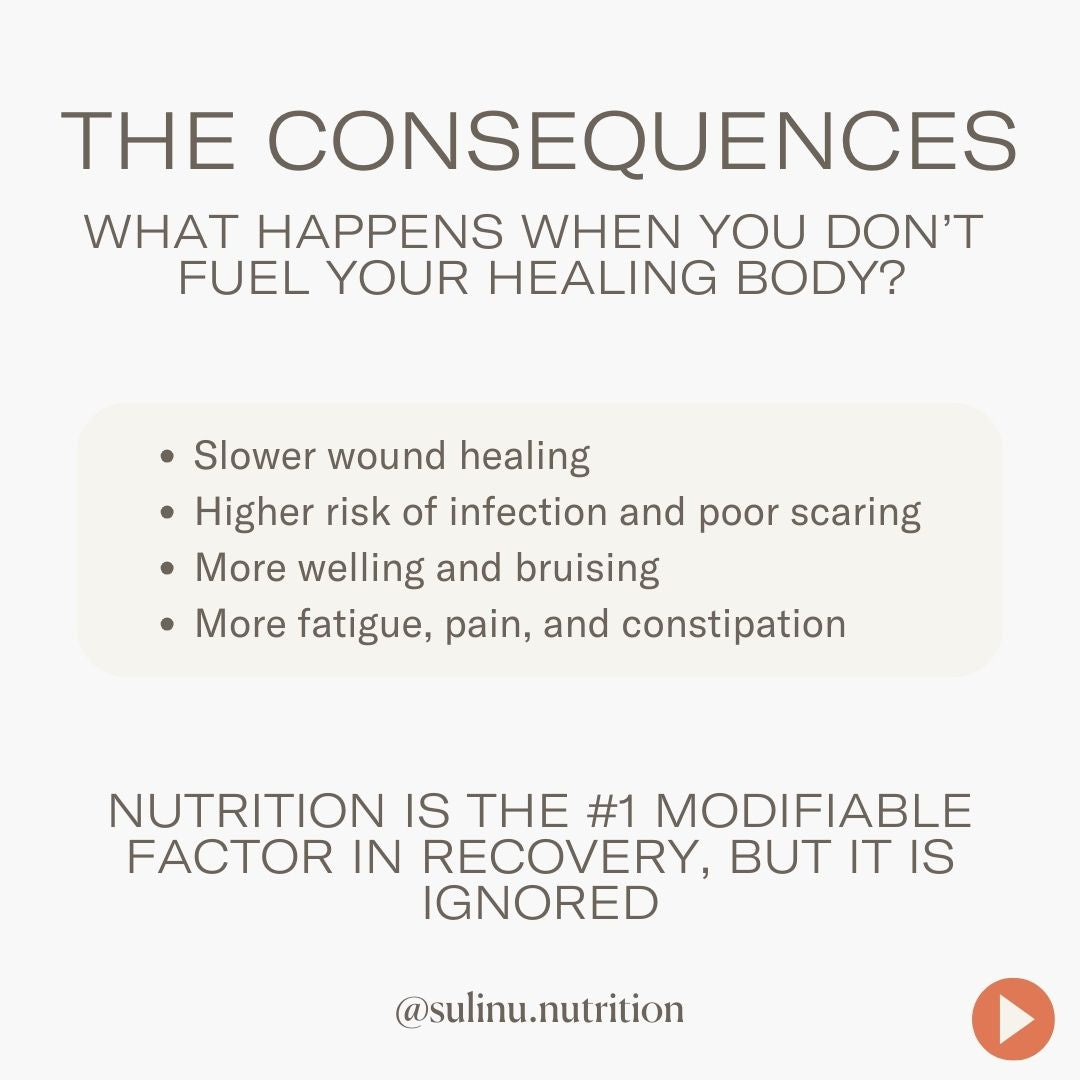
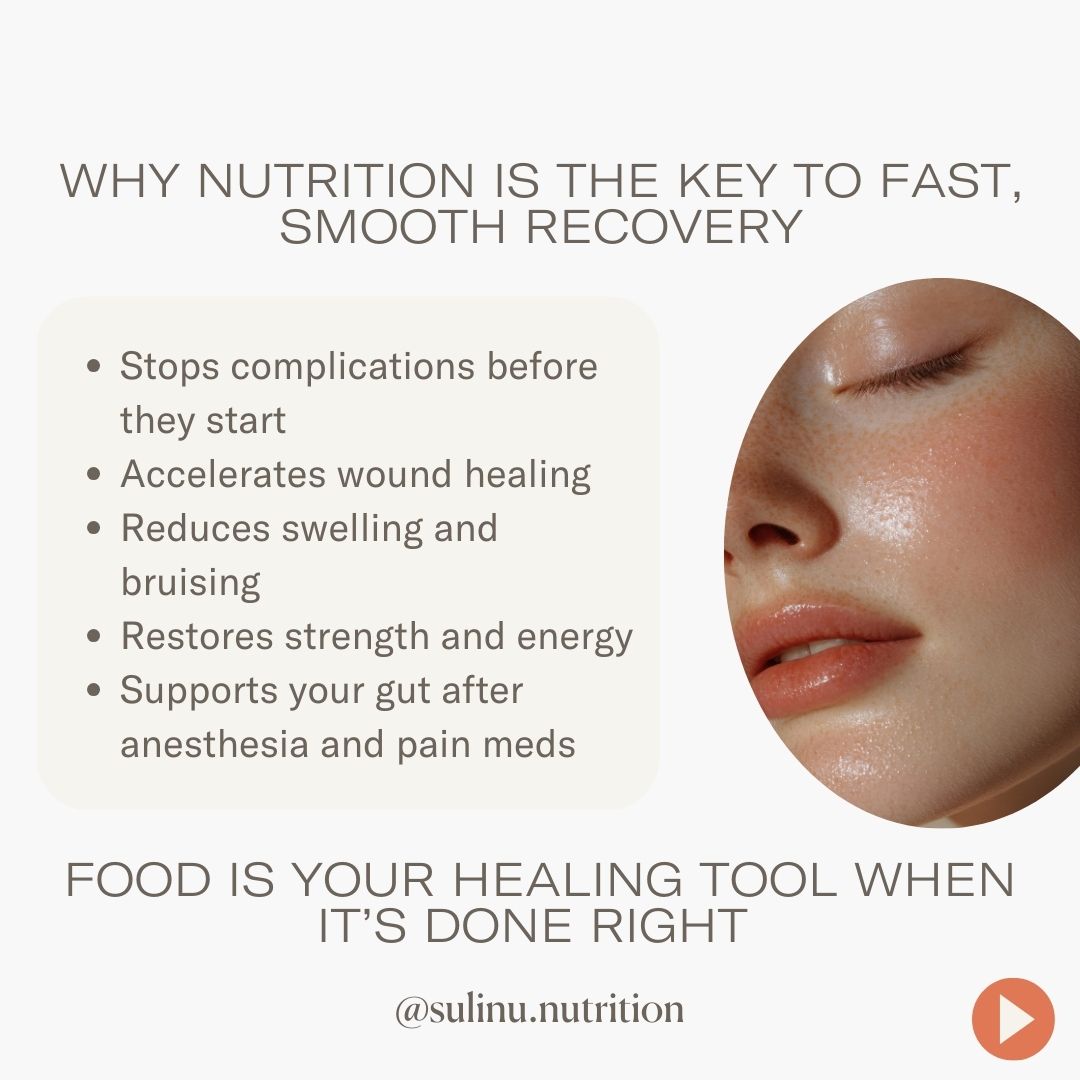
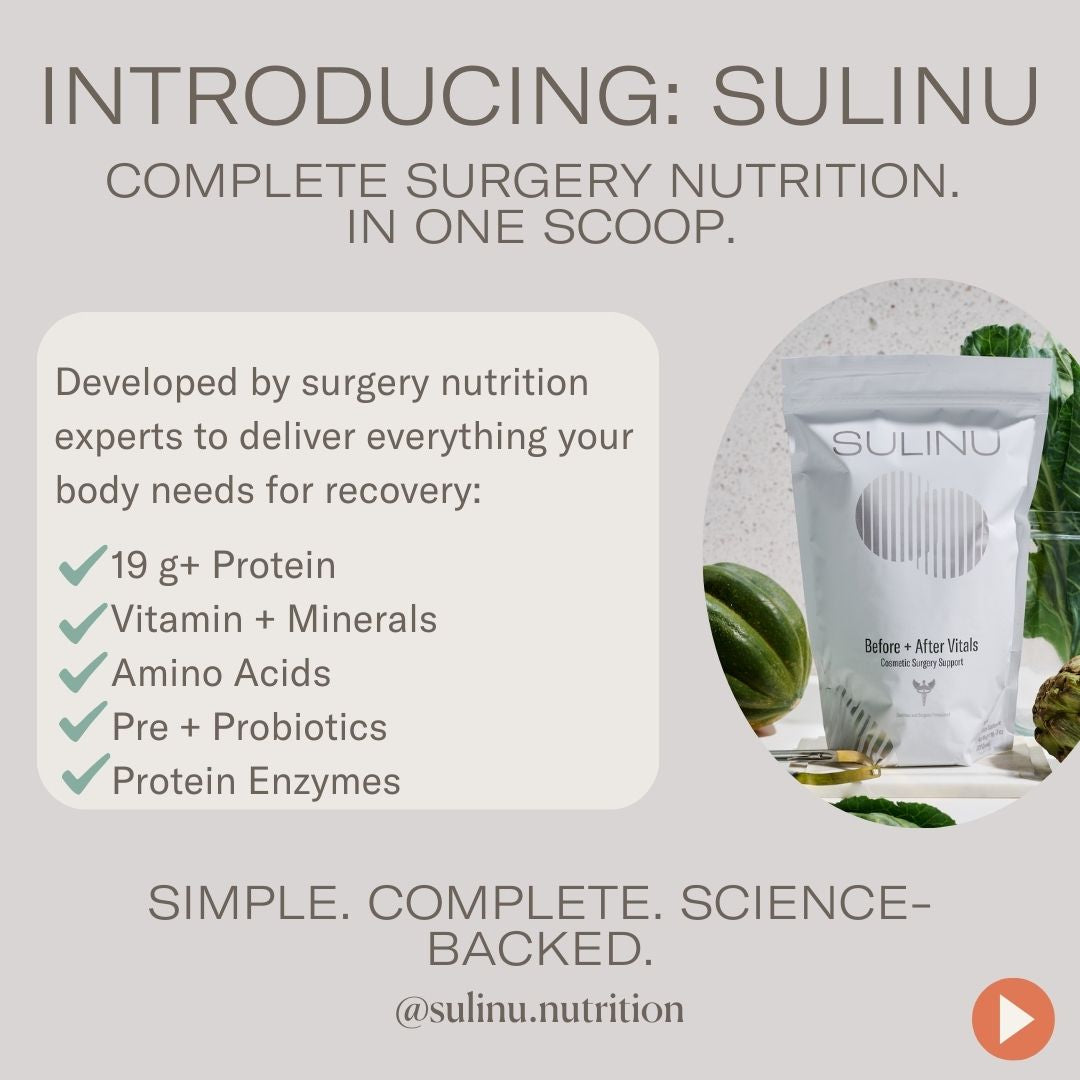
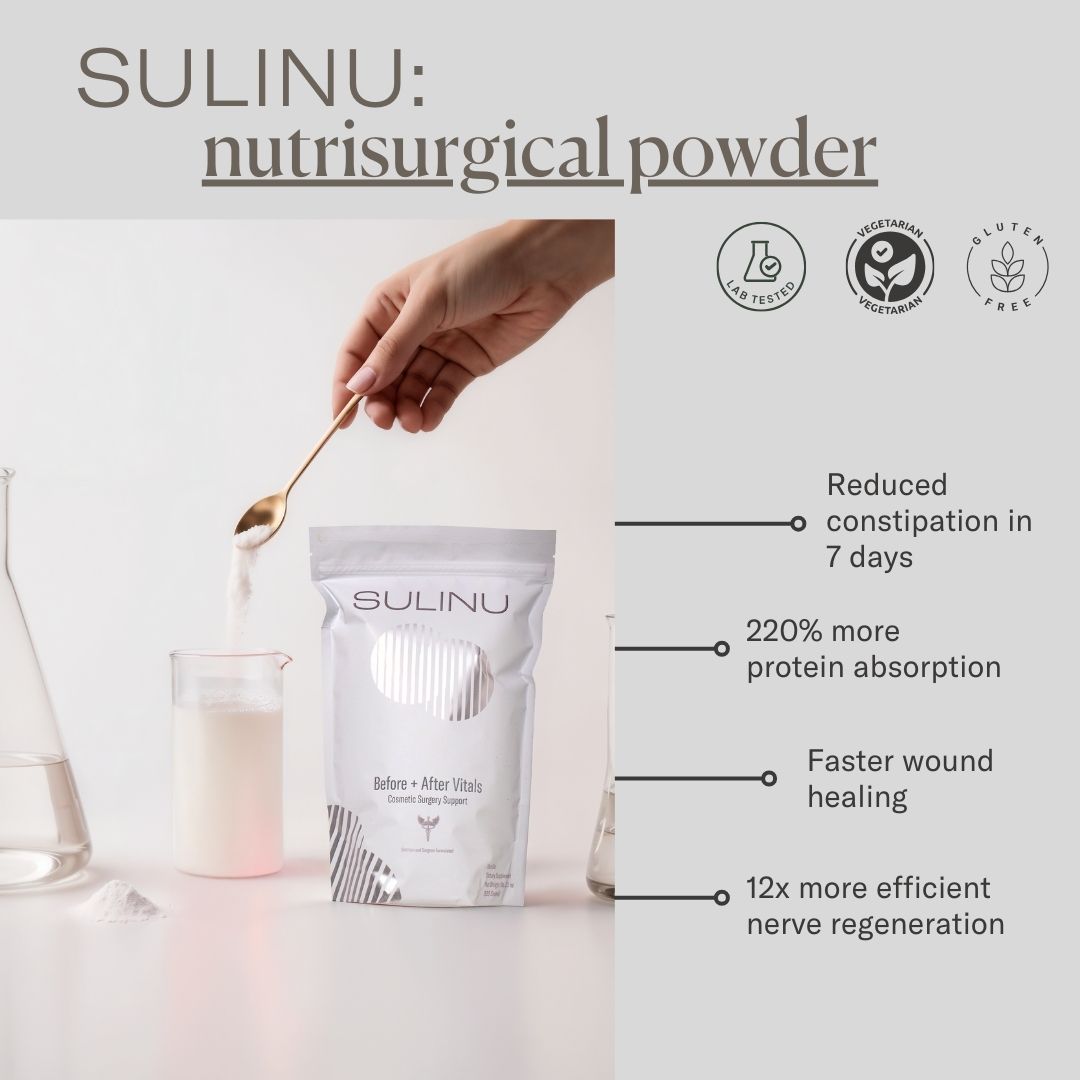
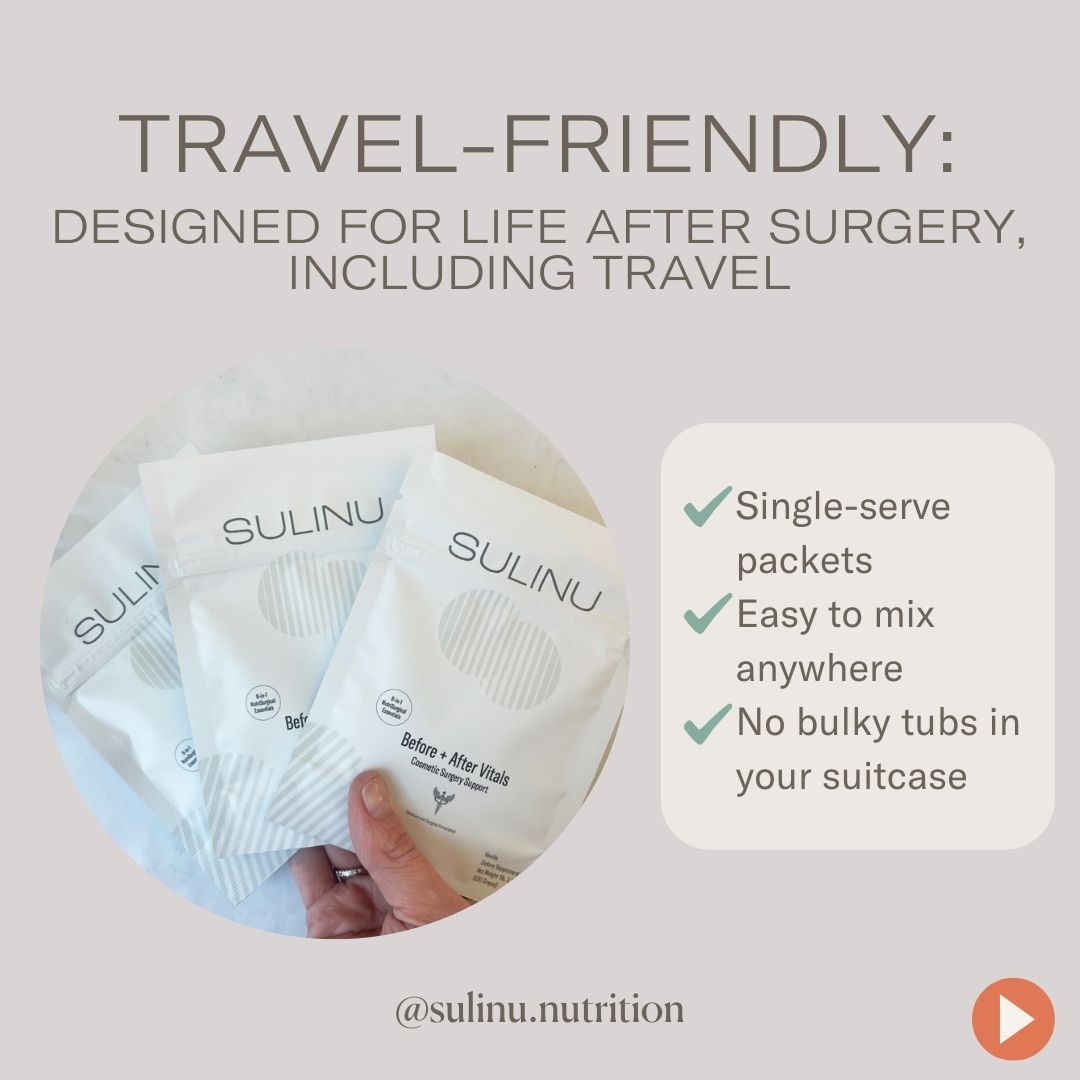
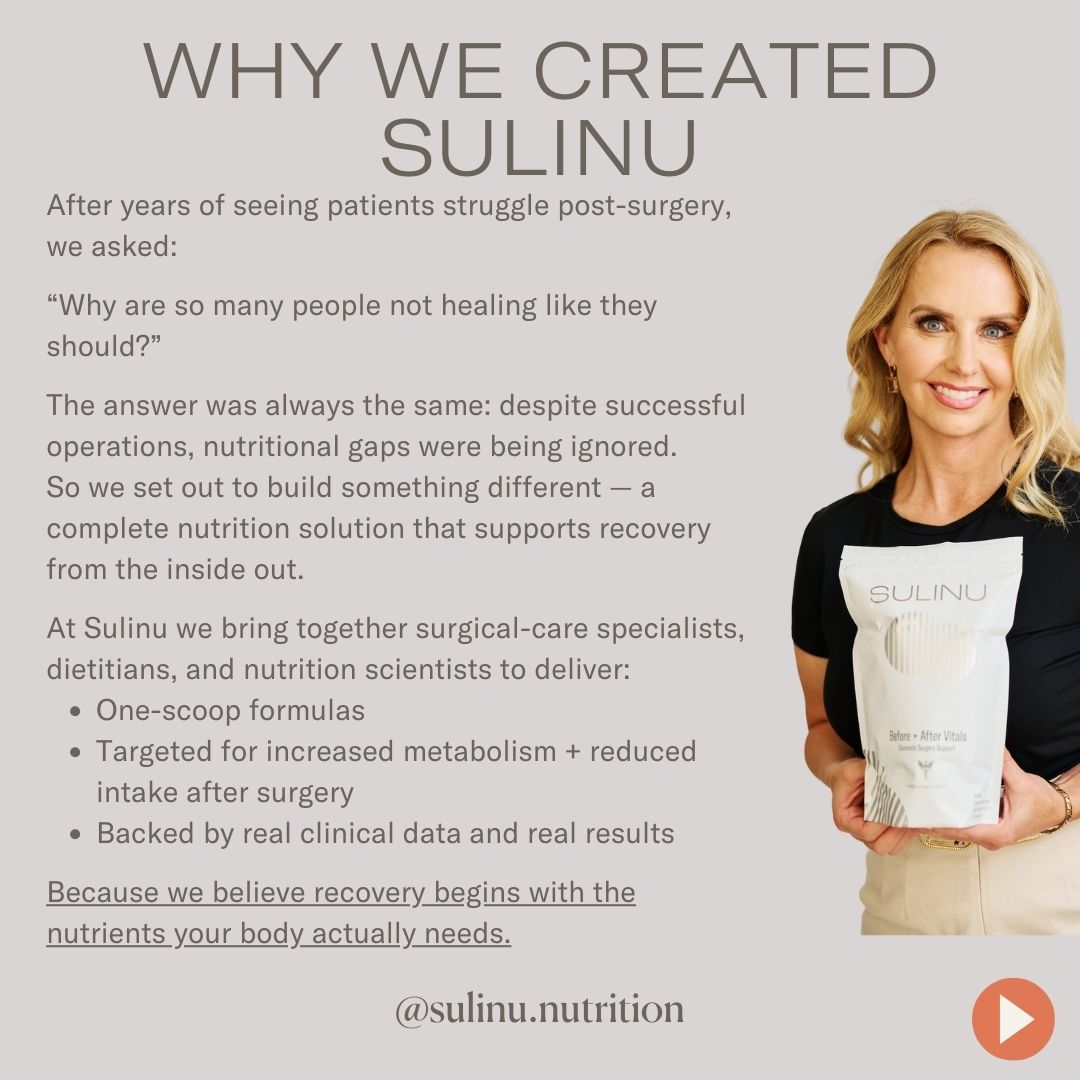
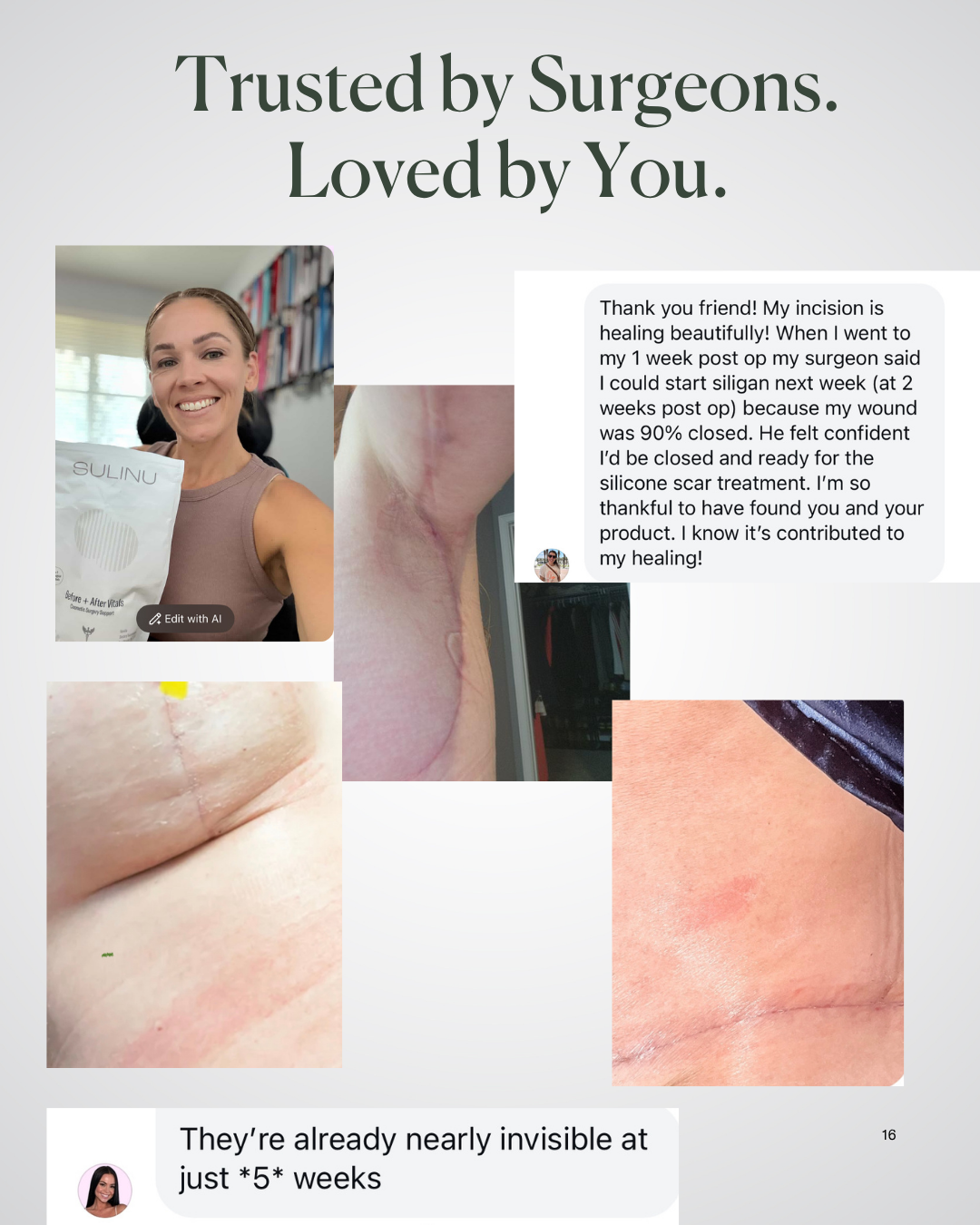
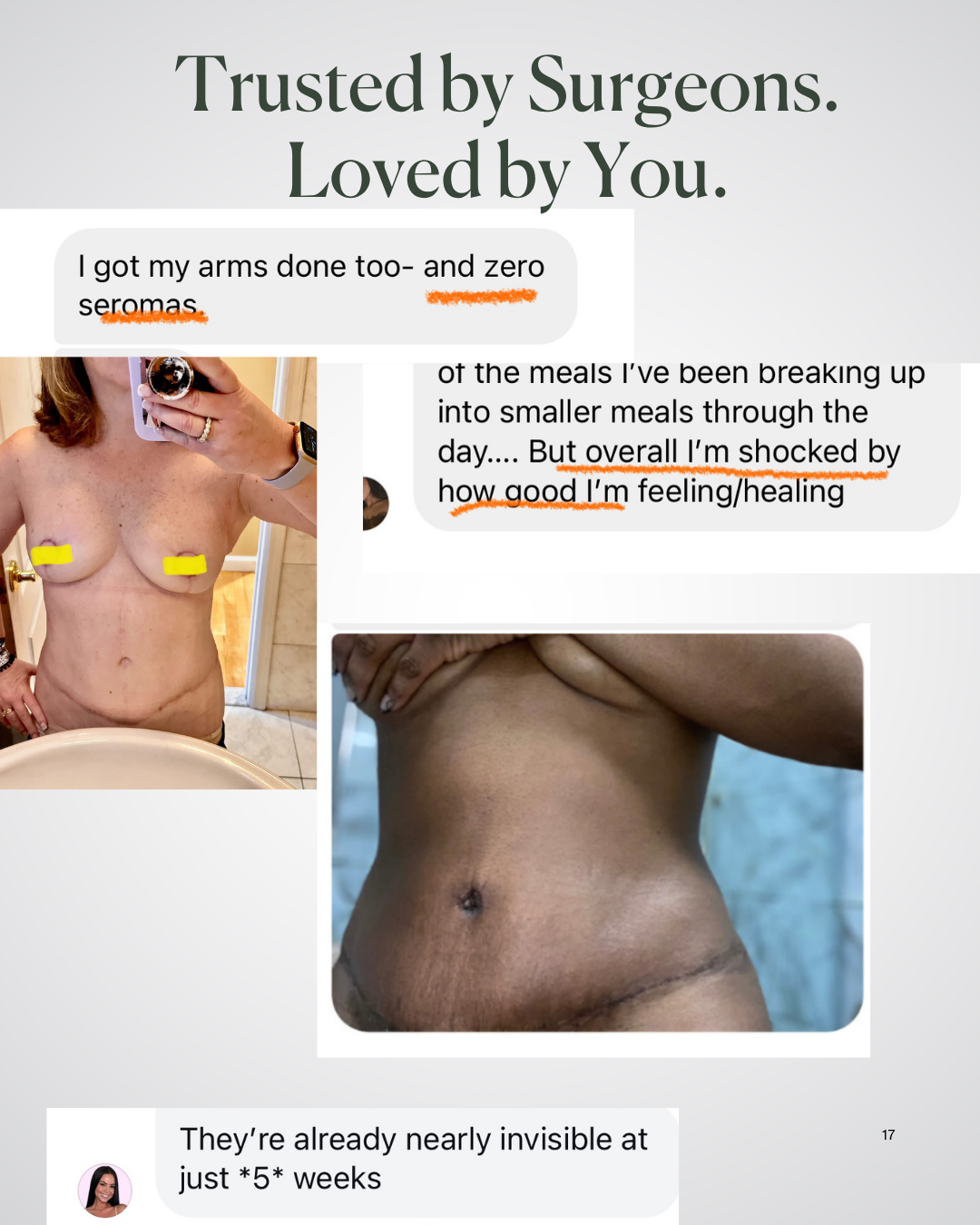
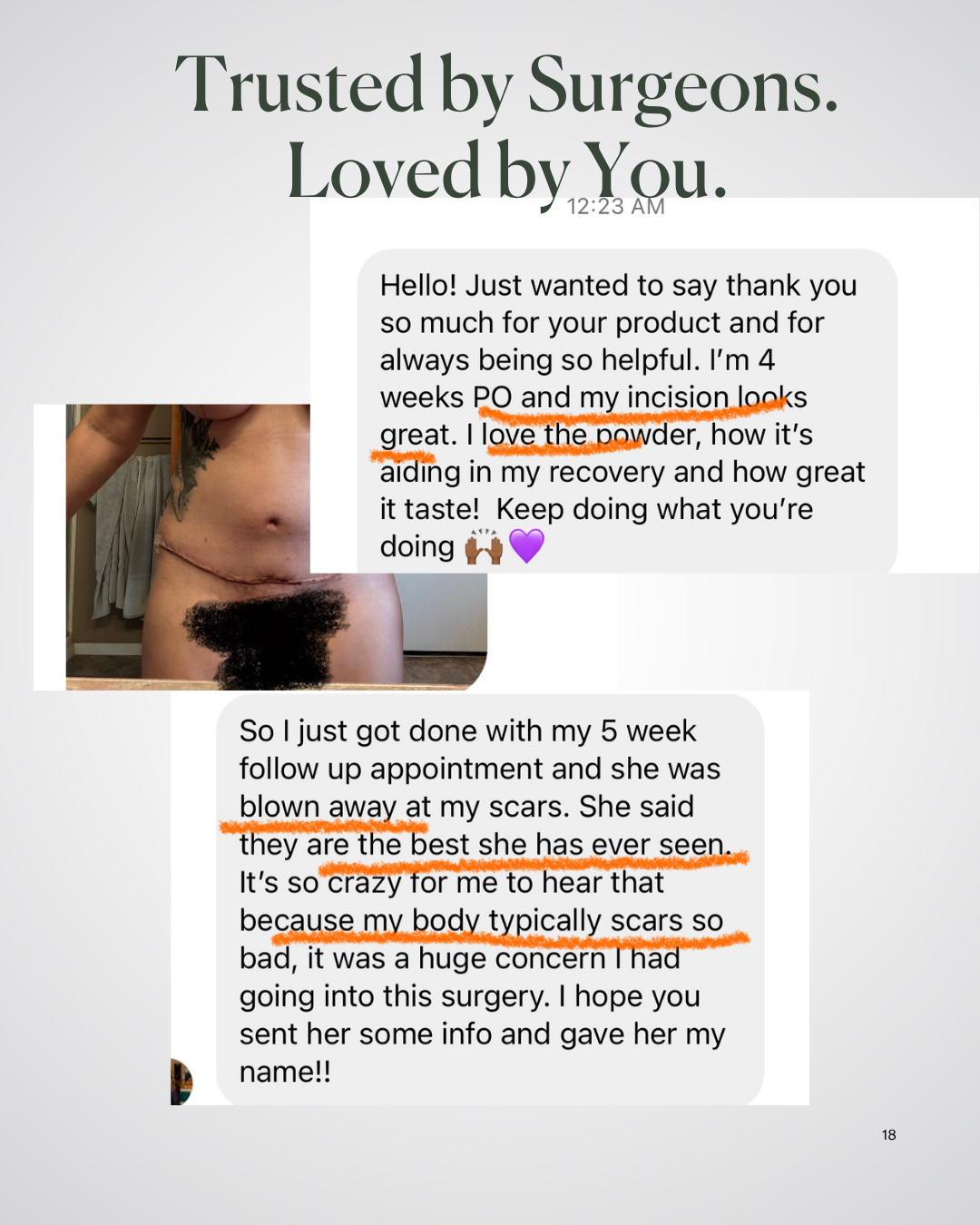
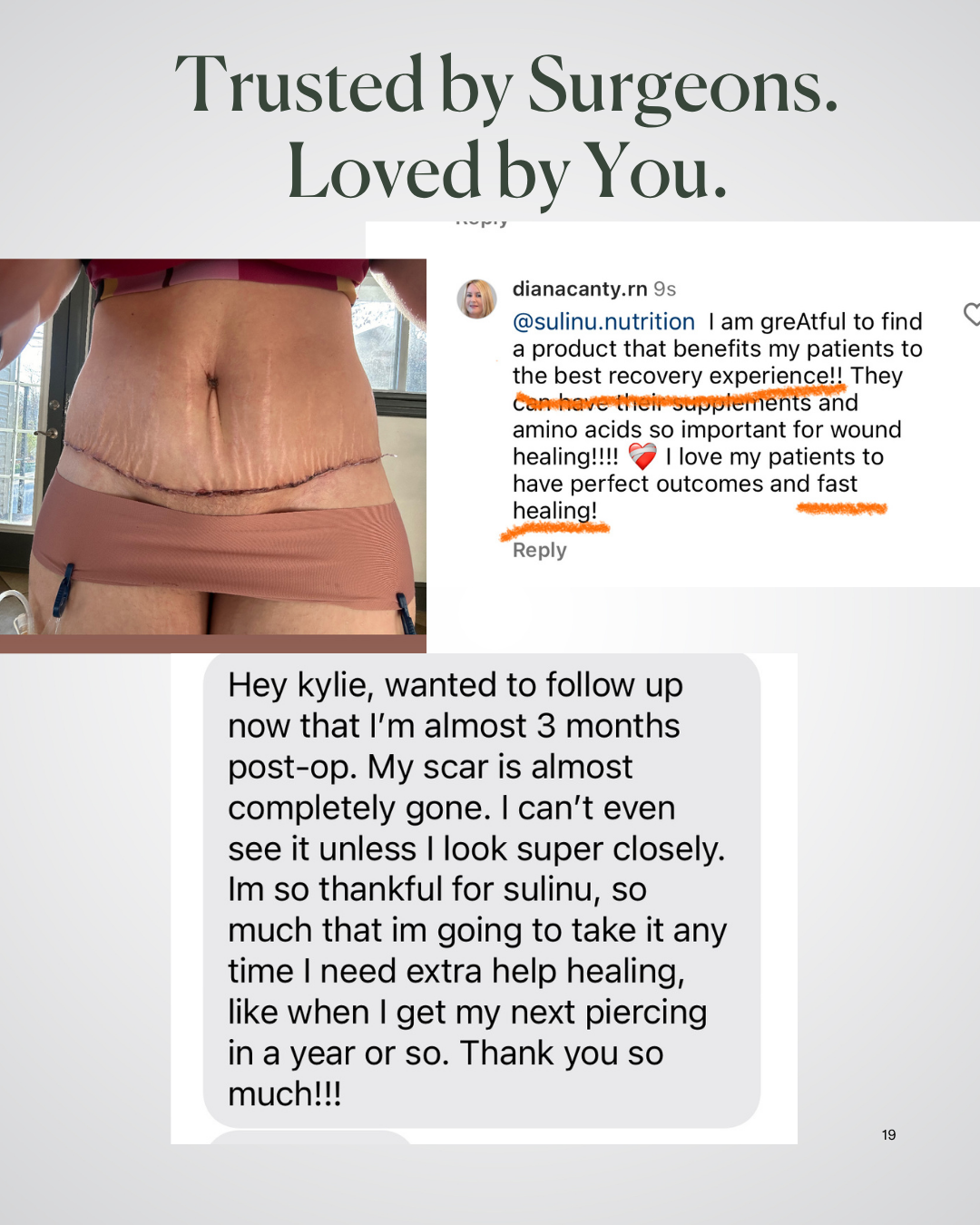
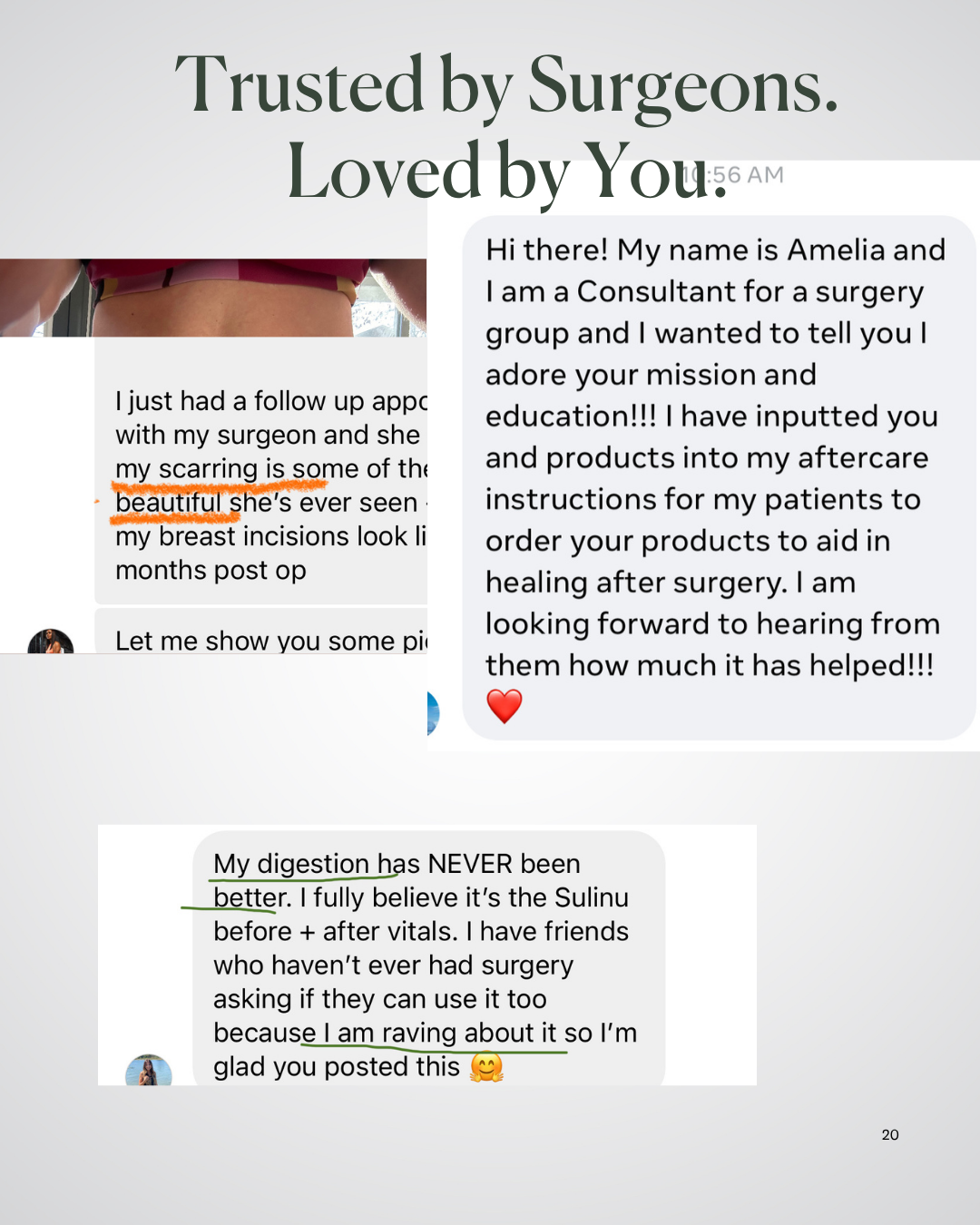
NUTRISURGICAL VITAMIN POWDER -(bag: Vanilla)
**FREE SHIPPING for orders over $150!!**
- 100% Money Back Guarantee
- Discreet Shipping-Your privacy is important
- We recommend 3 bags for any surgery for the best results
This Complete Surgery Powder gives you EVERYTHING you need IN ONE SCOOP.
Pre and Post Surgery Supplements for that near-invisible scar look.
"Can you believe it? [My incision scars] are nearly invisible at just 5 weeks!" -Jessie
Our pre and post surgery supplements are packed with vitamins for wound healing after surgery
- 3rd party tested
- Gluten-Free
- Vegetarian Whey
-
27 Surgeon-Approved Ingredients
- In bioavailable forms
-
5 Patented Ingredients
- Patented is the HIGHEST standard of ingredients
- Faster Incision healing
- Gut microbiome studied
- Clinically tested
- Sourced from Europe and Internationally
- Therapeutic Dosages
Perfect for:
- Before Cosmetic Surgery
- After Cosmetic Surgery
- Slow-to-heal incisions or wounds
- Using a GLP and needing extra nutrition
- Can begin taking at anytime on your surgery journey, EVEN if you are weeks after your surgery! Your scar is healing for a least a year after your surgery date.
How to use:
- Use 1/2 to 1 scoop a day. Max 1 scoop a day for at least 6 weeks postop.
- We recommend 3 bags: Use 1 bag before surgery and 2 bags after surgery
Nutrisurgical Vitamin Powder with Patented, Clinically-tested Ingredients.
All your Protein, Collagen, Amino Acids, MicroNutrients, Synbiotics and Enzymes in ONE SCOOP to give you a seamless recovery after cosmetic surgery.
Note: This product is also commonly used by GLP (Ozempic, Semiglutide, etc) patients to prevent nutrient depletion and Ozempic face
Our Survey Results*:
79% reported a beautiful incision
85% reported a faster recovery
90% liked the taste
X Gluten X Soy X Artificial Colors or Flavors X GMOs
*based upon our postop survey 2024
Introducing BEFORE + AFTER VITALS, the ultimate surgeon-endorsed nutritional supplement tailored exclusively for plastic surgery recovery.
Fears of infection, inflammation, slow-to-heal incisions, and bruising are taken head-on by this super fine, quick-to-dissolve powdered supplement. Add a delicious hit of vanilla flavor to your cold or warm drinks, smoothies, or culinary creations.
1 pouch is 20 servings.
ALLERGY info: Contains lactose. Product was processed in a facility that may also process eggs, peanuts, sesame, soy, tree nuts, shellfish, and other allergens.
